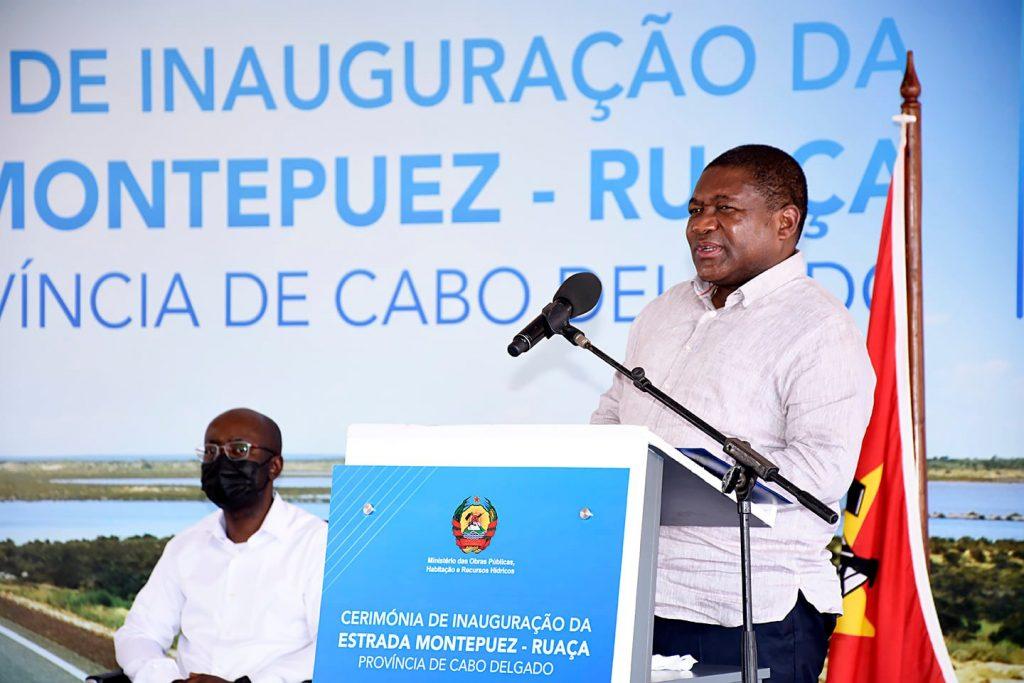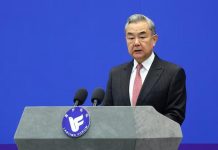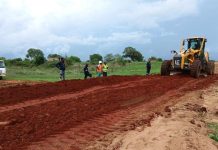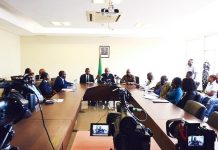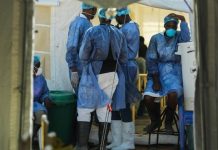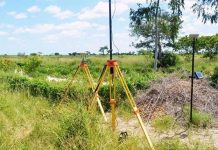Africa-Press – Mozambique. Yesterday, the President of the Republic inaugurated the 135-kilometre stretch of National Road Number 14 between Montepuez and Ruaça, in Cabo Delgado.
Recalling that the province is infiltrated by terrorists, Filipe Nyusi called for surveillance to forestall it being used by insurgents fleeing to the neighbouring province of Niassa.
The Montepuez-Ruaça stretch of road passes through the district of Balama, and cost more than 2.8 billion meticais. The road, which connects Cabo Delgado and Niassa provinces, includes two bridges, one over the Ruaça river on the border between the two provinces, and the other over the Nacohucuhucu river.
In Balama, the district which hosted the inauguration, residents had waited since the early hours for the president to inaugurate the paved road they had waited for for so long.
President Nyusi arrived around 10:00 a.m. and, after hearing information about the characteristics of the road, he unveiled the commemorative stone and cut the ribbon.
And, sure of the good condition of the road, he took to the wheel of his own official vehicle, an act infrequently witnessed.
In speeches, the head of state observed that this infrastructure must serve the population and the country’s development, and not the contrary.
“It is not to facilitate the movement of terrorists from one province to another. Let’s be vigilant,” Nyusi warned. “We all know that terrorist groups sow pain and mourning in Cabo Delgado and tend to seek refuge in Niassa province. But the brave young people [of the Defence and Security Forces] are waiting from them there.”
Filipe Nyusi warns that the newly inaugurated road must neither serve the interests of poachers, given that the road crosses the Niassa National Reserve. In fact, our reporting team established that a police checkpoint was installed in the Ruaça area, during the construction of the road, precisely to deal with poaching.
The President of the Republic also warned against the road becoming an accident hotspot, calling on motorists to drive prudently and urging local authorities to educate pedestrians appropriately.
During his speech, Nyusi remarked that he knew from experience what it was to have no tarred roads, since he was born in Cabo Delgado, and cars seldom came because of the condition of the roads. He remembered walking long distances, he said.
Now, with the use of vehicles, distances which previously took seven hours could be covered in two, bringing greater dynamic to both travel and commerce.
“We have to capitalize on the good opportunities that are now opening up, as we have arable land for agriculture, including high-yield crops, access to the Niassa Reserve tourist area, plus graphite, rubies and more. We have to capitalise to the maximum possible, so that this road is not just for sightseeing,” he exhorted.
Filipe Nyusi said that the focus would now shift to the Negumano-Mueda section, already in progress and also in Cabo Delgado, which would finally tar the link between Mozambique and neighbouring Tanzania.
Government financed most of the road
Of the 135 kilometres of the Montepuez-Ruaça section, the government built around 76 kilometres with its own funds, and the other part came from external financial assistance, according to Minister of Public Works Osvaldo Machatine, who did not mention the amounts disbursed by each party, but rather detailed the distances sponsored by each of the funders.
The Japanese International Cooperation Agency (JICA) financed “nine kilometres, the AfDB (African Development Bank) a length of about 50 km and the Government of Mozambique a length of approximately 76 km,” he detailed, adding: “It’s gratifying when we bring our resources to bear on our roads.”
The African Development Bank says that the road between Montepuez and Ruaça would improve the quality of life of residents.
“The sections from Ruaça to Marrupa and from Litunda to Lichinga have already been rehabilitated and handed over to the government. All that remained to complete the corridor was the stretch that is being delivered. We believe that both the economy and the quality of life of the inhabitants of Cabo Delgado will greatly benefit from this road,” the AfDB’s César Augusto Abogo said.
The governors of Cabo Delgado and Niassa, Valige Tauabo and Judite Massangele, also highlighted shared gains, particularly the fact that the Montepuez-Ruaça road would give Niassa access to the Port of Pemba, via which it would be able to more easily sell produce and increase the flow of trade.
Investments and improved employment and self-employment opportunities for young people is what the population would gain from the new road, said Hilário Luís, representing the residents of the district of Balama. Local businesspeople say they have no doubts that the infrastructure now inaugurated will open up broader horizons for business, and in this way, develop Cabo Delgado and the country.
The inauguration of the Montepuez-Ruaça road in Cabo Delgado took place three days after President Nyusi inaugurated the Cuamba-Muíta section in Niassa, connecting the cities of Cuamba and Lichinga by paved road for the first time.
By Jose Joao

